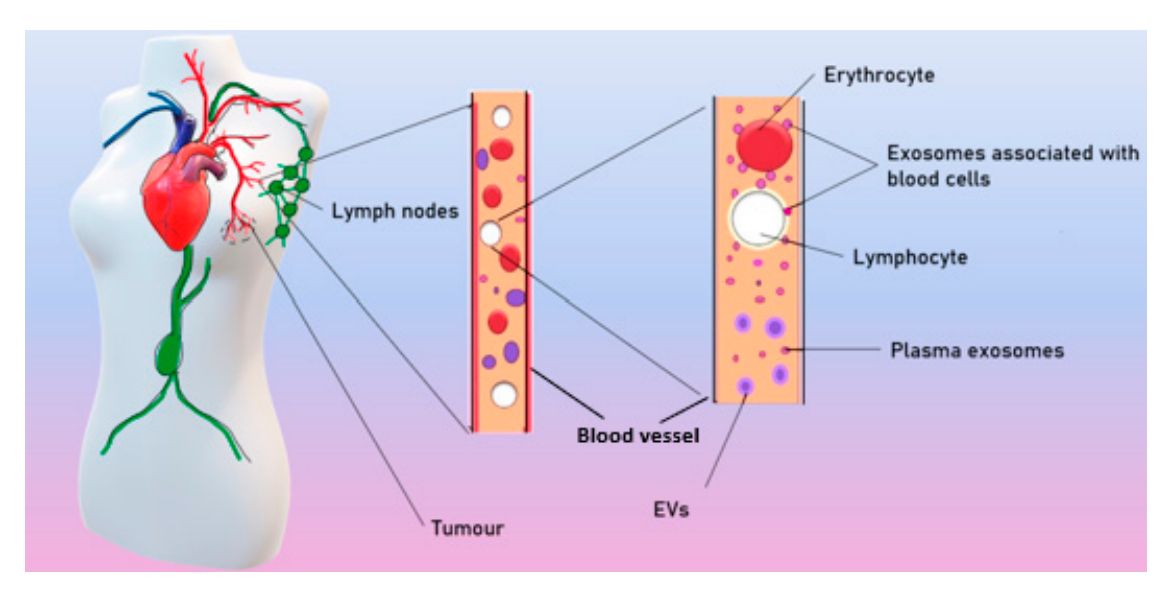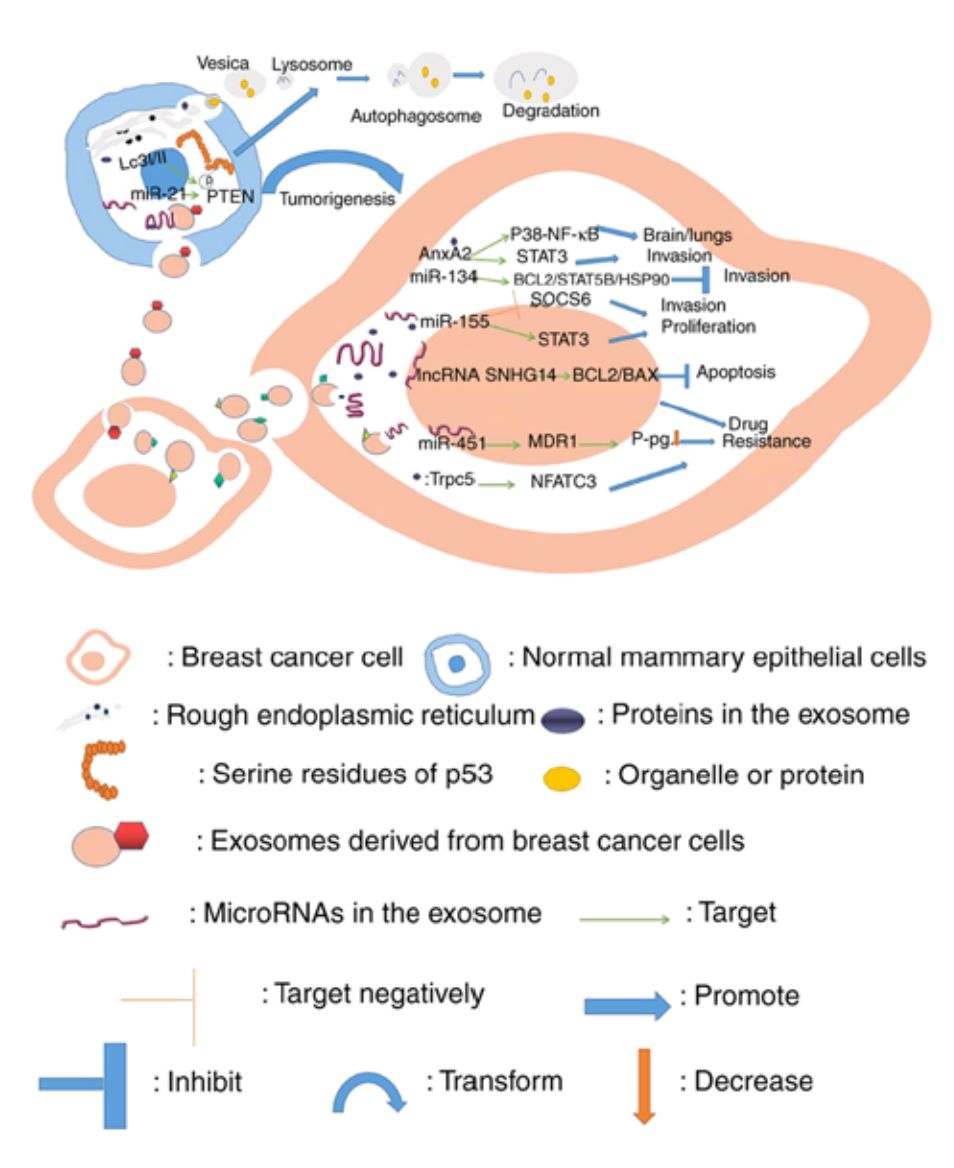Exosome Research in Human Breast Cancer
Breast cancer is a major health problem worldwide, with the highest mortality and morbidity rates. Despite the application of cutting-edge therapeutic strategies, the control of breast cancer remains unsatisfactory. It is thus essential to elucidate how this heterogeneous disease develops and identify its mechanisms. Recent research has shown that exosomes are involved in intercellular communication and cancer development. Tumor-derived exosomes have been identified as essential regulators in breast cancer, playing a critical role in modulating immune cell activity and promoting disease progression.
 Figure 1. Spreading of breast cancer exosomes in the organism. (Shefer A, et al., 2022)
Figure 1. Spreading of breast cancer exosomes in the organism. (Shefer A, et al., 2022)
How do Exosomes Contribute to Breast Cancer Development?
Exosomes play an essential role in breast cancer development, angiogenesis, tumor microenvironment formation, invasion, drug resistance, and recurrence. Breast cancer cells can release exosomes into the tumor microenvironment and act on stromal cells such as cancer-associated fibroblasts (CAF) and cancer stem cells, affecting intercellular and intracellular signaling, and promoting the survival and proliferation of cancer cells. Exosomes secreted by CAF containing a large number of growth factors can promote the growth and proliferation of cancer cells, while CD81-positive exosomes secreted by CAF can promote the invasion and migration of breast cancer cells through the Wnt signaling pathway. In addition, other stromal cells in the breast cancer microenvironment can also secrete exosomes and regulate the development of breast cancer.
 Figure 2. The role of exosomes in the development of breast cancer. (Wang L, et al., 2020)
Figure 2. The role of exosomes in the development of breast cancer. (Wang L, et al., 2020)
Therapeutic Uses of Exosomes in Breast Cancer
Although strategies including surgical intervention, chemotherapy, radiation therapy, and hormone therapy have been used to treat breast cancer, treatment outcomes have been unsatisfactory. To overcome obstacles such as drug resistance and high toxicity, We provide high-quality exosome products to help clients find new therapies and delivery technologies for the treatment of breast cancer.
| Cat No. | Product Name | Source |
| Exo-CH06 | HQExo™ Exosome-MCF-7 | Exosome derived from human breast cancer, noninvasive cell line (MCF-7 cell line) |
| Exo-CH07 | HQExo™ Exosome-MDA-MB-231 | Exosome derived from human breast cancer, aggressive/invasive/metastatic cell line (MDA-MB-231 cell line) |
| Exo-CH24 | HQExo™ Exosome-SK-BR-3 | Exosome derived from human breast carcinoma cell line (SK-BR-3) |
| Explore All Exosomes Isolated from Human Breast Cancer | ||
- Exosomes as a Complementary Tool for Liquid Biopsy
Liquid biopsy refers to the extraction of patient body fluids and analysis of biomarkers of tumor tissue origin in a non-invasive manner. Compared with traditional diagnostic imaging and pathology, liquid biopsy has the benefits of being non-invasive, reproducible, and providing timely results. Exosomes derived from breast cancer cells have obvious cell specificity, in which proteins, DNA, miRNA, and other biomolecules are blocked by lipid bilayer structure and not easily degraded. Through the analysis of exosomes, more and more tumor-related biomarkers have been identified. For breast cancer, ER, PR, HER2, MCF-7, CA15-3, etc. can be used as specific markers for breast cancer. As a tool for liquid biopsy, exosomes are an effective complement to histologic testing and contribute to the accurate diagnosis of breast cancer.
Exosomes are natural carriers of various biomolecules that enable intercellular communication. In the era of precision medicine and individualized therapy, these nanovesicles have the potential for specific drug delivery due to their non-immunogenicity, targetability, and high biocompatibility. Transfection of anti-RNA substances or anticancer genes into exosomes, the use of drugs to interfere with the loading or delivery of exosome contents that promote tumor development or the removal of specific exosomal compounds from circulation. Exosomes use affinity to deliver active regulatory compounds to other cancer cells or the microenvironment to inhibit tumor development.
- Exosome-based Vaccines
Cancer immunotherapy relies heavily on CD8+ T cells to promote cytotoxic T lymphocyte (CTL) activity and initiate tumor-specific CTL in lymphoid organs. Activation of immune responses using exosome-based vaccines is a promising option for breast cancer treatment. Tumor-derived exosomes contain specific and relevant antigens that can be used as a source to stimulate immunity against tumor cells. Research has shown that exosomes modified with miR-155, miR-142, and let-7i have enhanced immune stimulation leading to dendritic cell maturation.
- Disrupting Exosomes as a New Strategy for Treating Breast Cancer
Since exosomes play an essential role in intercellular communication, disrupting this communication could be a new approach to treating breast cancer. The steps of exosome release, transfer of biomolecules, and uptake are potential drug targets. Research has shown that exosome release affects drug retention in cancer cells while blocking the secretion of small molecule exosomes can increase cell sensitivity to chemotherapeutic drugs such as 5-fluorouracil.
Exosomes play an essential role in the development of breast cancer and the formation of the tumor microenvironment. Creative Biostructure has been committed to exosome research for many years. We offer a comprehensive range of exosome products and one-stop exosome services to help clients explore new strategies for breast cancer diagnosis and treatment.
Our scientists have extensive experience in exosome isolation, characterization, engineering, and functional analysis to ensure the delivery of accurate and reliable results. If you have any questions, please feel free to contact us.
References
- Shefer A, et al. Exosomes in Breast Cancer: Involvement in Tumor Dissemination and Prospects for Liquid Biopsy. International Journal of Molecular Sciences. 2022. 23(16): 8845.
- Wang L, et al. Exosomes: A rising star in breast cancer (Review). Oncol Rep. 2020. 44(2): 407-423.
- Tang Q, et al. Recent Advances in Detection for Breast-Cancer-Derived Exosomes. Molecules. 2022. 27(19): 6673.
- Liu T, et al. Exosomes in Breast Cancer - Mechanisms of Action and Clinical Potential. Mol Cancer Res. 2021. 19(6): 935-945.
